On the morning of August 31, in Da Nang city, Prime Minister Pham Minh Chinh - Chairman of the National Committee on Digital Transformation chaired a conference on improving the efficiency of providing and using online public services.

Politburo members: Nguyen Hoa Binh , Permanent Deputy Prime Minister; Luong Tam Quang, Minister of Public Security co-chaired the conference; also attended were representatives of leaders of ministries, branches, and central agencies. The conference was broadcast online to ministries, branches, and People's Committees of provinces and centrally run cities.
In his opening speech at the Conference, Prime Minister Pham Minh Chinh emphasized the need to review the goals set by the 13th National Party Congress to evaluate which targets have been achieved well and to improve them; for targets that have not been achieved, breakthrough solutions must be found; and for targets that are achievable, they must be accelerated.
The Prime Minister expressed that the time to prepare for Party Congresses at all levels and towards the 14th National Party Congress is still very limited, so we must race against time.
The Prime Minister stated that Da Nang was chosen to host this conference because the city is one of the leading localities in the country in digital transformation; he said that in digital transformation, there are three main pillars: building a digital government, a digital society and digital citizens. Regarding digital government, many localities have actively implemented it, of which Da Nang has achieved outstanding results.

The Prime Minister shared that digital transformation has become an inevitable trend, an objective requirement and a strategic choice, a top priority for many countries and Vietnam. Digital transformation not only focuses on the field of socio-economic development but also enters other industries and fields such as national security and defense, foreign affairs, affecting peace, war, and conflict...
Digital transformation has become an inevitable trend, an objective requirement and a strategic choice, a top priority for many countries and Vietnam. |
Digital transformation is no longer a problem of a single country, agency, unit, or individual, but is a global, comprehensive, and nationwide issue. Therefore, we must also have a global, comprehensive, and nationwide approach, and at the same time, we must have a focused, key solution.
In the reform process, we take people as the center and subject. Therefore, digital transformation focuses on the effective use of public service provision. Both the providers and users of public services must apply digital transformation effectively; both state management and public service beneficiaries must improve the efficiency of using online public services.

The Prime Minister stated that digital transformation has been strongly promoted in both the public and private sectors, from central to local, urban to rural, from children to grandparents, or in other words, digital transformation has "reached every alley, knocked on every door, reached every subject"; the thinking, actions, and habits of administrative agencies at all levels and people and businesses in performing administrative procedures have gradually shifted from traditional paperwork to the online environment, helping to improve the efficiency and productivity of socio-economic activities. Administrative reform has 6 areas, focusing on reform for people and businesses. From this movement, there are many good, creative, and effective models in digital transformation in general, and providing online public services in particular. The Prime Minister emphasized the need to evaluate which places are doing well and doing well to share experiences.
In addition to the achieved results, the Prime Minister also frankly pointed out many limitations and shortcomings: the thinking, awareness and actions of leaders at all levels have not met the requirements of reality; digital infrastructure has not developed synchronously, in some places and at some times there are still difficulties such as remote areas, border areas, islands, along with that, electricity infrastructure also needs to be one step ahead; the effectiveness of online public service implementation has not met expectations, only 17% of local records are processed online, while 80% have not been processed.
The effectiveness of online public service implementation has not met expectations, with only 17% of local records being processed online, while 80% have not been processed. |
The Prime Minister requested to find out the cause of this situation, analyze, dissect, choose which work to stop; besides the inadequacy due to the system itself not being effective, there are big challenges such as having to meet more and more, higher demands from the administration at all levels and people, businesses in using online public services and rapid development of socio-economic activities.

The Prime Minister pointed out that the world and regional situation is evolving rapidly and complicatedly, so the policy response of authorities at all levels and the political system must be quick, timely, and effective, including tools to serve policy response, including digital tools.
"We see that this issue poses a challenge, which is to have electricity infrastructure, human resources, leadership and direction from all levels in the political system, in leadership, direction and administration. We cannot carry out electronic procedural transactions on the basis of semi-manual, semi-electronic, manual documents, but must be synchronous and comprehensive; we need to have data, digitize data, national data and share this data, from which we can have intelligence; the database must be available, complete and connected," the Prime Minister emphasized.
The Prime Minister is concerned that state resources are limited because they have to deal with many big issues, so other resources must be mobilized for digital transformation development and online public services.
According to the Prime Minister, resources come from thinking; motivation comes from innovation; strength comes from the people. "From thinking and awareness, how can resources be created? Therefore, we must review the institutions; the problem is that there must be institutions to promote resources. So how can resources be mobilized from the people and businesses?". The Prime Minister affirmed that this can only be solved by institutions, regulations, and rules.
Our Party has summarized: people make history. We must think because when reality requires, we must adjust. Therefore, developing digital technology products must first serve the needs of people and businesses, then reach out to the region and the world because in the current context of global integration, a global problem cannot be solved by one country. Digital transformation is penetrating every home and every person globally. The problem is how to integrate to promote national strength combined with the strength of the times in the field of digital transformation suitable for each revolutionary stage.

The Prime Minister requested ministries, branches and levels to evaluate the results of awareness, thinking, leadership, direction, operation, implementation, and benefits brought to people and businesses; find good models, effective ways of doing things, and valuable experiences; look straight at the truth, are there any problems in thinking and awareness? Are there any unclear issues in leadership, direction and operation? Are there any institutional issues that need to be resolved? How should implementation be organized? If we set the goal of putting people and businesses at the center, will people and businesses benefit? Are there any problems that the State needs to resolve, what experiences need to be drawn, especially in completing the goals set by the 13th National Party Congress and Party Congresses at all levels?
The Prime Minister emphasized that time is limited and there is a lot of content. He hopes that delegates will focus their thinking and intelligence, uphold their sense of responsibility, research and speak correctly, concisely, and directly to the point, with an output to resolve difficulties, and share good experiences and good practices for the whole country.

According to the Ministry of Information and Communications, over the past 20 years, providing online public services has been the core and central task of state agencies in deploying information technology applications, developing e-government and digital government; when taking people as the center, as the service object. This is clearly shown in the orientation, strategy and direction documents of the Government and the Prime Minister. In the period of extensive development (from 2020 to present): since the start of implementing the National Digital Transformation Program in Decision No. 749/QD-TTg dated June 3, 2020 of the Prime Minister. During this period, the number of administrative procedures put online has increased dramatically (including partially online and fully online public services). The annual growth in quantity is equal to the previous 10-year period, specifically as follows:
In terms of quantity: the rate of administrative procedures provided as online public services reached about 81% . Of which, the rate of administrative procedures with records provided as online public services nationwide reached 55.5% 1, the ministerial block reached 59.68% ; the local block reached 55.38% .
Some ministries and branches have implemented very well, with 100% of public services online, such as the Ministry of Industry and Trade, Ministry of Education and Training, Ministry of Labor, War Invalids and Social Affairs, Ministry of Information and Communications, and Vietnam Social Security.
Some localities have implemented online public services very well throughout the process, such as Da Nang with 95.56% ; Ca Mau with 91.99% ; Tay Ninh: 91.98% . The national public service portal has integrated nearly 4,400 online public services, helping people and businesses conveniently access online public services of ministries, branches and localities through a single "one-stop shop" .

Regarding quality, on June 24, 2022, the Government issued Decree No. 42/2022/ND-CP regulating the provision of information and online public services by state agencies in the network environment, notably the provisions on Full-process Online Public Services and Management, monitoring, and evaluation of the effectiveness and level of use of online public services by state agencies automatically through the System for monitoring and measuring the level of provision and use of Digital Government services (EMC).
To carry out the assigned tasks, the Ministry of Information and Communications has deployed the EMC System to measure, monitor, and evaluate the effectiveness and actual level of use of online public services in providing online public services.
From the end of 2023, the Ministry of Information and Communications will measure the rate of online records of ministries, branches and localities through the EMC System. The results achieved so far are that the rate of online records nationwide has reached 43% , 2.5 times higher than at the end of 2023; of which the ministry and branch sector reaches 63% 2, and the local sector reaches 17.9% .
General assessment of the implementation of online public services and directions for the next phase: Vietnam has gone through two development phases of online public services since 2011. Phase 1 is the initial phase when the number of high-level online public services deployed is very small nationwide; Phase 2 is the phase of extensive development, when there is a breakthrough in the number of online public services.
The implementation of online public services has been successful but uneven among ministries, branches and localities. Besides the units with high results, there are still many units with very low results, especially in the whole process of online records. Some localities have achieved a very high rate of up to 69% , however, there are still many localities with a very low rate of less than 5% , the average of the local block has only reached 17.9% .
Full-process online public services bring real efficiency when people and businesses can simply and conveniently perform the entire process online and do not have to be present at state agencies, demonstrated through the rate of full-process online records. To enter phase 3 - In-depth development, it is necessary to focus on popularizing full-process online public services to all people and businesses, the goal is to have the rate of full-process online records reach 70% .
The universalization of online public services will bring all activities of civil servants and public employees serving people and businesses to the online environment. At that time, state agencies will have full digital data to direct and operate online and based on data. Completing the universalization of online public services will help Vietnam complete the task of developing e-Government, moving on to developing digital Government...
Source


![[Photo] Ca Mau "struggling" to cope with the highest tide of the year, forecast to exceed alert level 3](https://vphoto.vietnam.vn/thumb/1200x675/vietnam/resource/IMAGE/2025/11/04/1762235371445_ndo_br_trieu-cuong-2-6486-jpg.webp)
![[Photo] Panorama of the Patriotic Emulation Congress of Nhan Dan Newspaper for the period 2025-2030](https://vphoto.vietnam.vn/thumb/1200x675/vietnam/resource/IMAGE/2025/11/04/1762252775462_ndo_br_dhthiduayeuncbaond-6125-jpg.webp)
![[Photo] Ho Chi Minh City Youth Take Action for a Cleaner Environment](https://vphoto.vietnam.vn/thumb/1200x675/vietnam/resource/IMAGE/2025/11/04/1762233574890_550816358-1108586934787014-6430522970717297480-n-1-jpg.webp)

![[Photo] The road connecting Dong Nai with Ho Chi Minh City is still unfinished after 5 years of construction.](https://vphoto.vietnam.vn/thumb/1200x675/vietnam/resource/IMAGE/2025/11/04/1762241675985_ndo_br_dji-20251104104418-0635-d-resize-1295-jpg.webp)

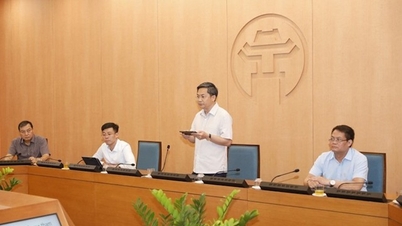




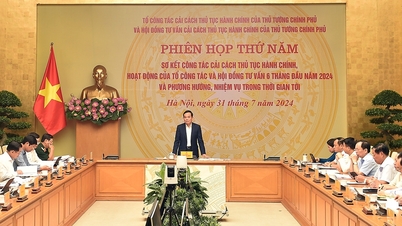





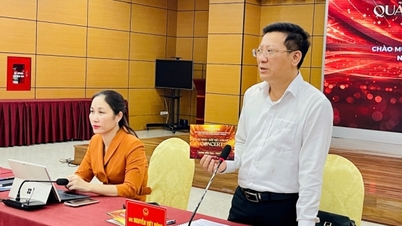

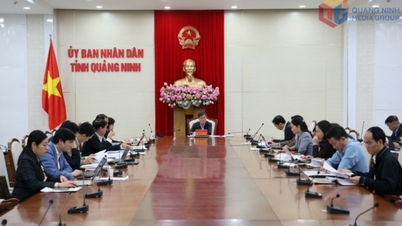





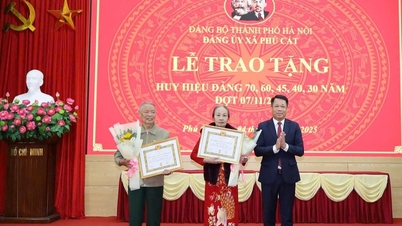

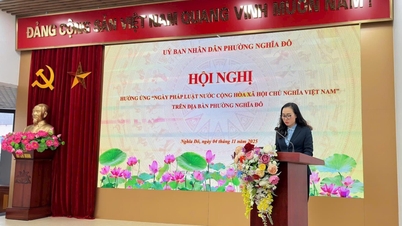























































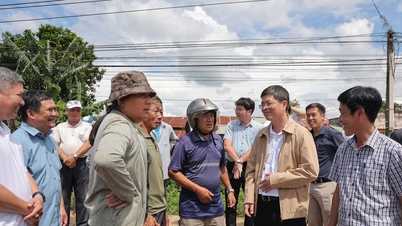

















Comment (0)